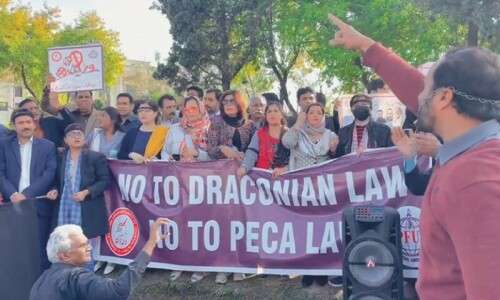Introduction
Amnesty International has raised significant concerns over the proposed amendments to Pakistan’s cybercrime laws, warning that they could further tighten the government’s control over the country’s already highly regulated digital landscape. This warning came after the controversial bill to amend the Prevention of Electronic Crimes Act (Peca) was introduced in the Senate, drawing strong protests from opposition parties, journalists, and civil rights organizations.
In this article, we will examine the potential impact of the changes to the Peca law, explore the objections raised by various stakeholders, and analyze the broader implications for Pakistan’s digital freedoms.
The Controversial Amendments to Peca Law
The bill to amend the Prevention of Electronic Crimes Act (Peca), which was recently presented in the National Assembly and passed by the lower house, introduces significant changes that could have serious implications for digital expression in Pakistan. A central element of the proposed changes is Section 26(A), which seeks to criminalize the dissemination of “false or fake information” online, with penalties that include up to three years in prison or fines of up to Rs 2 million.
Key Features of the Proposed Amendments:
- Criminalization of “Fake News”: Section 26(A) proposes severe penalties for individuals found guilty of disseminating information deemed to be false or misleading, particularly if it causes “fear, panic, or disorder” in society. The vague language of this provision raises concerns about its potential misuse to target individuals or organizations critical of the government.
- Creation of New Authorities: The amendments also propose the creation of the National Cyber Crime Investigation Agency (NCCIA), which would take over the responsibilities of the Federal Investigation Agency’s (FIA) Cybercrime Wing. Additionally, the Social Media Protection and Regulatory Authority (SMPRA) would be established to oversee content on digital platforms, including the power to block content that contradicts Pakistan’s ideological principles.
- Powers to Block Content: The proposed changes would grant SMPRA extensive powers to remove and block content that the authorities deem unlawful, including content that targets institutions such as the judiciary, military, or parliament.
Concerns Raised by Amnesty International and Human Rights Organizations
Amnesty International has been outspoken in its criticism of the proposed amendments to the Peca law. According to Babu Ram Pant, Deputy Regional Director of Campaigns for Amnesty’s South Asia chapter, these amendments will further restrict online freedoms and consolidate the government’s control over digital expression in Pakistan. Pant described the amendments as “draconian” and warned that the law would exacerbate the state’s already poor record of protecting digital freedoms.
Amnesty’s Main Concerns:
- Vague Language in Section 26(A): Amnesty International pointed out the ambiguity of the term “fake news” and its potential for misuse. The bill does not provide a clear definition of “fake news” and leaves the decision to authorities who could interpret it in any manner, potentially silencing dissent and limiting free speech.
- Excessive Punishments: The maximum penalty for distributing “fake news” is up to three years in prison and a fine of Rs 2 million. Amnesty International has called these penalties excessive, noting that they are disproportionate to the offense.
- Lack of Consultation: Amnesty also criticized the lack of public consultation and debate on the bill, arguing that it was presented without proper engagement with civil society, human rights organizations, or stakeholders in the digital space.
Human Rights Commission of Pakistan’s (HRCP) Concerns
The HRCP echoed similar concerns, particularly regarding the bill’s potential to curb fundamental rights. HRCP expressed deep worry that the law could be used to target political dissenters, human rights defenders, and journalists, stifling any opposition to the government.
HRCP also criticized the vague language around “fake news” and the excessive penalties, which it argued could be used to suppress legitimate expression. The formation of multiple new authorities to regulate digital content was seen as a potential infringement on freedom of expression and could result in excessive government control.
Impact on Journalists and Media Freedom
Journalists in Pakistan have strongly opposed the proposed amendments, with many describing the changes as an “attack on freedom of expression.” A walkout by journalists from the press gallery during the National Assembly proceedings highlighted the severity of their objections.
The new provisions could lead to increased censorship of the media and further constrain journalists who are already working under difficult conditions in Pakistan. By criminalizing the dissemination of information deemed to be “fake news,” journalists could face imprisonment or fines for reporting on sensitive issues or presenting alternative viewpoints.
Opposition Parties Speak Out
The opposition parties in Pakistan, particularly the Pakistan Tehreek-e-Insaf (PTI), have condemned the amendments to the Peca law. PTI leaders argue that the bill is an attempt to further consolidate the ruling party’s power and limit the opposition’s ability to challenge the government.
The opposition has also criticized the ruling Pakistan Peoples Party (PPP) for supporting the bill, accusing it of hypocrisy for backing a law that could suppress dissent. The PTI and other opposition members have vowed to oppose the bill in the Senate, where it will undergo further scrutiny.
Broader Implications for Digital Freedom and Governance
The proposed amendments to the Peca law are part of a broader trend in Pakistan towards increasing regulation and surveillance of digital spaces. The introduction of the Social Media Protection and Regulatory Authority (SMPRA) and the National Cyber Crime Investigation Agency (NCCIA) suggests a move toward more centralized control over online content.
The government’s ability to block content that contradicts Pakistan’s ideological principles could have serious consequences for the country’s digital ecosystem, restricting access to information and stifling free expression. Moreover, the proposed creation of the Digital Nation Pakistan Bill could further centralize personal data and introduce intrusive digital surveillance technologies.
These developments point to a growing trend toward digital authoritarianism, where the government exercises greater control over the digital space, often at the expense of individual rights and freedoms.
What Can Be Done?
Advocacy groups like Amnesty International and HRCP have called for a more open and transparent process in crafting laws that regulate digital expression. They urge the government to withdraw the bill and engage in meaningful consultations with civil society, journalists, and other stakeholders before proceeding further.
Moreover, the bill must be carefully reviewed to ensure that it complies with international human rights standards, particularly those related to freedom of expression and the right to access information.
FAQs
1. What is the Prevention of Electronic Crimes Act (Peca)?
The Prevention of Electronic Crimes Act (Peca) is a law in Pakistan that addresses cybercrimes and electronic offenses. It includes provisions related to online fraud, data breaches, cyberbullying, and the dissemination of false information.
2. What changes have been proposed to Peca?
The proposed amendments to Peca introduce penalties for the dissemination of “fake news,” grant new powers to regulate social media content, and establish authorities like the Social Media Protection and Regulatory Authority (SMPRA) to oversee online content.
3. Why are human rights organizations concerned about the Peca amendments?
Human rights groups like Amnesty International are concerned that the amendments could stifle free speech, restrict digital freedoms, and empower the government to censor content on vague grounds, leading to increased surveillance and repression.
4. What are the potential penalties for spreading “fake news” under the new Peca amendments?
The proposed amendments suggest that individuals found guilty of disseminating “fake news” could face up to three years in prison, a fine of Rs 2 million, or both.
5. How are opposition parties reacting to the proposed amendments?
Opposition parties, particularly the PTI, have strongly criticized the amendments, calling them an attempt to suppress political dissent and limit the media’s ability to report freely.
Conclusion
The proposed amendments to Pakistan’s Peca law have sparked significant controversy and concern among various sectors, including human rights organizations, opposition parties, and the media. The introduction of provisions to regulate and penalize “fake news,” along with the establishment of new regulatory authorities, could further tighten the government’s grip on the digital space, raising alarms about the erosion of fundamental rights. Stakeholders are calling for a more transparent and consultative approach to ensure that the law respects international human rights standards.



